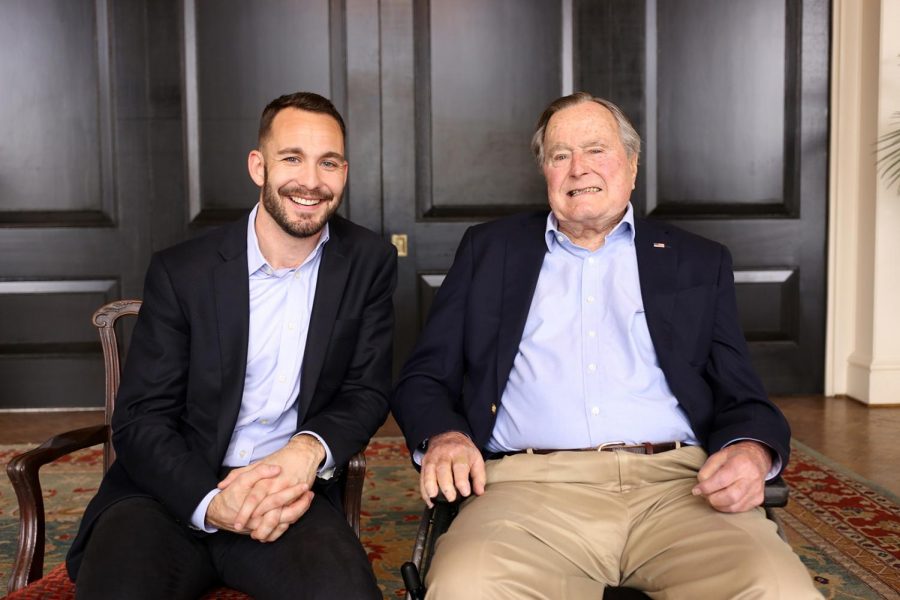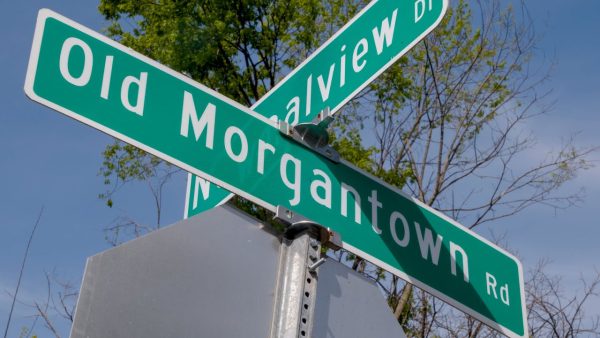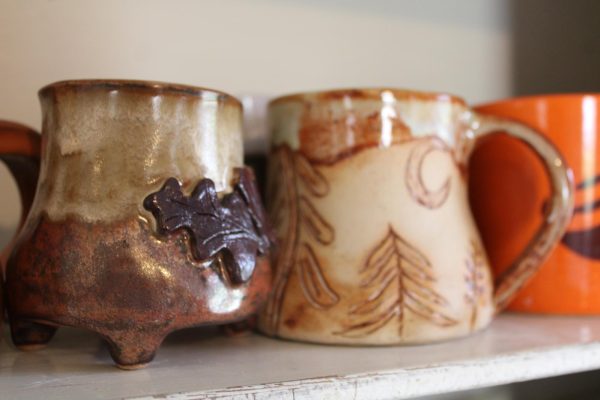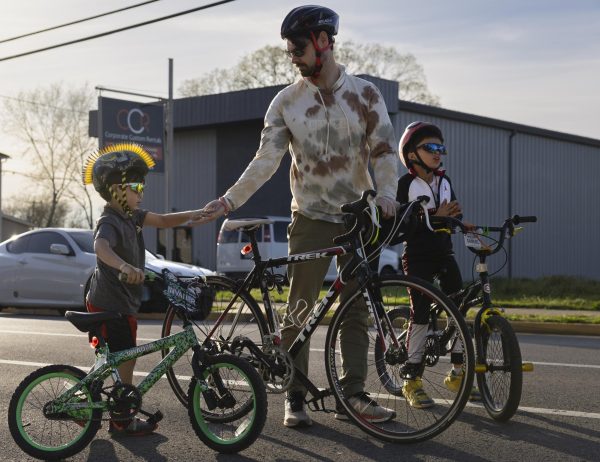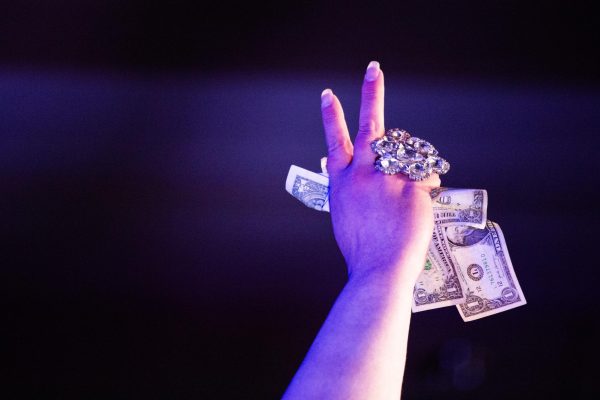WKU student details life as aide for George H.W. Bush
February 26, 2019
On the evening of Nov. 30, 2018, former President George H. W. Bush laid in bed surrounded by his family as Ronan Tynan, a member of The Irish Tenors, sang him “Silent Night.”
The president loved Christmas carols, and as Tynan sang by his bedside, he mouthed the lyrics with him.
“You can’t help but maybe take a step back and kind of look at this from a historical perspective—but he wasn’t just a patient,” said Evan Sisley, Bush’s personal aide for the last four years of his life. “He was a mentor.”
About four hours later, Bush died.
“I didn’t stop as much to think about my place in it, because my place was to provide direct care,” Sisley said. “I was doing what I was supposed to do.”
Behind a lens
Growing up in the suburbs of Washington, D.C., the only things Sisley, an aspiring photojournalist, could cover without press credentials were protests.
On Jan. 20, 2005, during former President George W. Bush’s inauguration, a group of anarchists attempted to storm through an entrance intended for the Secret Service. Sisley, a high-schooler at the time, had been following the group, known as the “black bloc,” around all day, taking photos of what ensued.
Sisley got kicked and pepper-sprayed when the police apprehended the group. He called the Associated Press and offered his images from the incident—the first time he sold his photos.
Sisley continued freelancing for Reuters and the Associated Press while in high school. Following high school, he started working for SIPA Press, now called SIPA USA, covering the White House and Congress. He was just 18.
SIPA told Sisley he needed to go back to school. He looked for photojournalism programs. Sisley came to WKU because of the program’s success in the Hearst Journalism Awards Program, founded in 1960. The WKU School of Journalism & Broadcasting’s photojournalism program has won first place in the Hearst photo competition 24 of the past 29 years.
In April 2007, Sisley contracted for TIME Magazine through SIPA to photograph the Virginia Tech University shooting, the deadliest school shooting in American history.
Freelancing for Time made Sisley feel like he’d been drafted into the major leagues, he said.
However, Sisley said after three days of photographing girls crying over the deaths of their sorority sisters, he walked into a bar, put his cameras down and realized he couldn’t do this kind of work for a living.
“I didn’t know it before, but I knew it afterwards that I wasn’t really cut out to do spot news like that,” Sisley said.
On the drive back to Bowling Green, Sisley decided he wanted to look into medicine instead. He said he thought it would offer a more direct way of helping people.
A new path
Sisley enrolled in a WKU Emergency Medical Technician course but later dropped out and began working on an ambulance for the Medical Center Emergency Medical Services in Bowling Green. Through that job, Sisley learned he was capable of dealing with blood and being decisive in high-pressure situations.
In 2009, Sisley became concerned the war in Afghanistan might end without him serving his country.
“I wanted to make a point of getting out there and doing my part,” Sisley said.
He enlisted in the Navy as a corpsman, serving with the Marine Corps.
Sisley said some go into the military for the wrong reasons—whether it be to travel or for the benefits that come with the “GI Bill,” which pays for college.
Not him.
“If you’re not doing it for a purely—I don’t know—altruistic reason, then you’re going to be let down,” Sisley said. “But no matter what, if it’s just to serve your country, you’re going to do that in the process.”
Sisley quoted former President George H. W. Bush, a decorated Navy pilot, and said his enlisting was more of a “red, white and blue thing.”
“If there was going to be an opportunity for me to be able to go overseas with the Marine Corps and help some of those guys who became injured and help them get home in one piece, that was going to be what I wanted to do,” Sisley said.
Sisley was deployed twice, serving a total of three years in active duty. In between deployments, he became a paramedic and received his associate’s degree from WKU.
During Sisley’s time in the military, the “Don’t Ask, Don’t Tell,” policy was in effect. It allowed LGBTQ people to serve as long as they did not admit it openly. It was discontinued while he served with the Marine infantry in Afghanistan.
Following that, Sisley decided he’d never go back in the closet with his sexuality, especially going forward as he took jobs.
Sisley began working for the Center for Translational Injury Research at the University of Texas Health Science Center in Houston.
When it came time for Bush to receive medical care in his home, Sisley said Bush and his wife, former First Lady Barbara Bush, originally rejected the idea. However, around this time, Bush’s chief of staff, Jean Becker, found a news article about veterans coming out of war in Iraq and Afghanistan having problems getting jobs.
Becker brought this to the president and first lady and said, “There’s a problem. We need to help.”
The Bushes then decided to hire student veterans, believing they would have little to do around the house and would need to fill their days with studying.
The Bushes asked a group of Navy corpsman if they wanted a side job providing medical care to the former president.
After Sisley was hired, Becker said she started sleeping better at night because she knew he had Bush’s back. Sisley, she said, was the right person the staff needed at the time.
Sisley worked as a medic for Bush until about a year later when he was promoted to the president’s personal aide.
“I do believe this from the bottom of my heart,” Becker said. “I believe that George Herbert Walker Bush probably was on this earth two to three years longer than he would have been because of Evan’s excellent medical care.”
Others always came first
Bush led by example in almost everything, Sisley said.
“There wasn’t a lot of advice he would give,” Sisley said. “I think when you’re in your 90s, you’re kind of out of the advice-giving business. But what I will say—if you’re paying attention—there are plenty of things to pick up.”
A lesson Sisley learned while watching Bush was to put others ahead of self. Bush’s grade-school nickname, Sisley said, was “Have Half,” because if he had something, he would always offer the other half to anyone around him.
Bush’s family didn’t suffer during the Great Depression, but his family taught him that “to much is given, much is expected,” Sisley said. This mindset is what drove Bush to public service in the first place.
“He was the type of person who would reach out to you and tell you it’s going to be OK and he’s thinking about you when you’re having the worst day of your life,” Sisley said.
That quality, Sisley said, is something lost today.
“You can’t help but want to become a better version of yourself, which is just inspired by the legacy of public service, their commitment to this country that you’ve seen through their entire life,” Sisley said.
In the blink of an eye
Bush faced death at 20 years old while serving in World War II when his plane was shot down. He told biographer Jon Meacham that at that moment, he thought he was done. He eventually made it to safety, going on to live a full life, serving in multiple political offices and raising six children.
“You never know when somebody is going to die,” Sisley said. “You can kind of come up with some ideas, but you never know. There’s no way to predict.”
The morning of Nov. 30, 2018, the former president had a large breakfast next to long-time friend, former Secretary of State James Baker.
Baker also managed several of Bush’s campaigns, but their relationship was originally forged on the tennis courts of Houston.
“They had a very personal connection,” Sisley said. “[Baker] was capable of advising President Bush in a very honest way. That’s fairly rare in American politics, but they had such an intense friendship that went back so far that he could advise him when it was tough. He could tell him things he didn’t want to hear.”
Toward the end of Bush’s life, Baker and his wife checked on him almost every day.
As they spoke over breakfast shortly before Bush died, Bush looked up at Baker.
“Bake,” he said. “Where we going?”
“We’re going to heaven,” Baker replied.
“Well, that’s good,” Bush said. “Because that’s where I want to be.”
Sisley said he believes he comes from a generation where people don’t know a lot about Bush aside from Saturday Night Live skits and the news. He said it was an honor to serve Bush and his family and learn about who they were personally, not just how they were represented on the news.
“The amount of respect and how gracious they were towards me and my husband — they believe in loyalty up and loyalty down, and I think that’s something that they definitely taught me,” Sisley said.
The next steps
Now, Sisley spends his days closing Bush’s office and making sure his estate is in order. Sisley is taking online courses from WKU.
He is set to graduate in August with a bachelor’s degree in interdisciplinary studies with a health emphasis.
But, Sisley said his heart is still in photography.
“Thinking that I could use photography to, you know, help this country or, you know, inspire some sort of social change from people was why I went into photojournalism in the first place,” Sisley said.
The only time he had that moment was in his job working for Bush. Sisley captured a photo of Sully, Bush’s yellow lab service dog, lying in front of Bush’s casket. The image would become one of the most memorable photos from the funeral.
Sisley said he plans on attending medical school, something Bush referred to as a “good resume builder.”
At the time, Sisley was surprised Bush had said that. But, Sisley said, he was the one who didn’t quite understand what Bush meant.
“Eight years of serving as the vice president of the United States was a resume builder,” Sisley said. “CIA director was a resume builder. Ambassador of the United Nations—chief liaison to China. All these things were resume builders. He didn’t achieve the ultimate prize in American politics until he was in his 70s.” The idea of capping out and not continuing to grow, Sisley said, was a foreign concept to Bush.
“You don’t ever stop,” Sisley said. “You keep on going down the road. You keep on growing. You always are looking onward and upward—always moving forward. Never stopping.”
Editor’s note: A previous version of this story incorrectly defined the acronyms EMT and EMS. It also incorrectly stated that Sisley became acquainted with a group of people providing care to President Bush from the University of Texas Health Science Center in Houston. The Herald regrets these errors.
Features editor Laurel Deppen can be reached at 270-745-6291 and laurel. [email protected]. Follow on her on Twitter at @laureldeppenwku.

